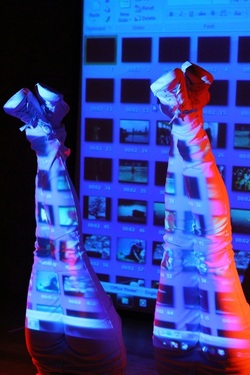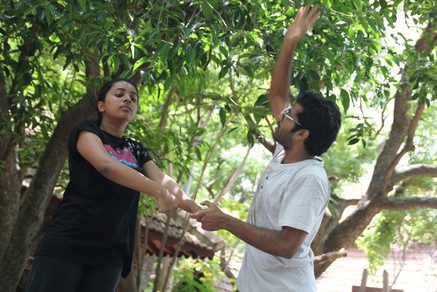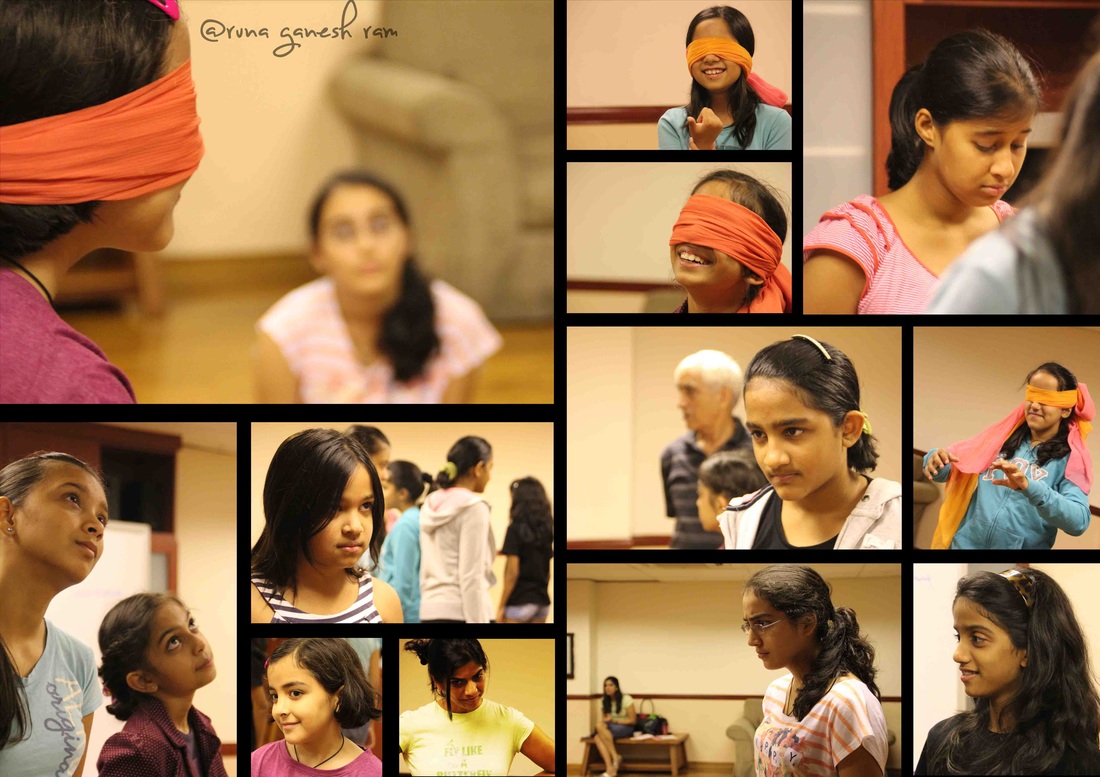 About a year ago, I was sitting in a session on performance composition. The professor facilitating the session started off with a question, what does warm up mean to you ? There were different answers in the room, but the one that stood out for me was this line contributed by my friend and performer Gintare. She said "The physical and psychological opening to the creative process". This one line has greatly influenced the way I approach my warm up sessions prior to beginning a creative process. Devising original work calls for a lot of self preparation for all those involved. Devising is about every individual in the space collectively influencing the creative outcome - and this requires you to in a flexible frame of mind and body, being open to everything coming in and being able to process content leaving aside our biases. Preparing the body and the mind together is critical. I have observed in many rehearsals over the years, that warm up is just a routine. I've noticed actors doing regular stretches, voice warmups and calling out lines, alone or in groups. This is certainly helpful, but the question every performer should ask themselves is - Is it making your mind and body flexible ? Is it really opening you up to the creative process that lies ahead of you ? There is no one warm up process that will work for all. Each individual is different and the warm up outcome will decide what we do in the session. I also urge performers to create for themselves and the group - A warm up outcome, which is to say, what you want the warm up to achieve. This could range from high energy to focus to timing to vocal clarity. Every individual in the performance can have different outcomes, but when it comes to an environment of collaboration, of shared space, the group warms could have similar outcomes, that the group works toward. When one is warmed up physically and psychologically, the ability to take on content and process it is much richer. The contributions made in the space feel fresher. And when people in the space know that the other is warmed up, then the energy in the room is different, there is mutual trust that is established and the creative journey feels wonderful.
1 Comment
I was 15 years young when I started theatre. I really wish I had started earlier, now that I understand why theatre matters and how it can channelize one's creativity, energy and thought. My initial theatre workshops in school were all about fun and playing games. Today, when I look back as a theatre practitioner, trainer and performer, I realize why and how theatre helps you, shapes you and defines you.
I taught theatre at a school in India for three years where I was handling sessions for children under the age of 12. In the initial sessions, children would sometimes tend to be shy, sometimes apprehensive and sometimes restless. But slowly through time, you start realising that the activities they are engaging in challenges them differently and children are able to focus their energies towards creative output. Group work for children is a lot about responsibility and team play. In these situations, children develop the ability to listen to one another as opposed to taking instructions from a teacher. This is when they feel they can freely voice their opinions among peers. They end up having conversations and find a new confidence altogether. From my experience in teaching theatre in schools, I've seen theatre transforming young students, sometimes in a year, sometimes in just a session. Here are five ways in which theatre impacts children and young adults in their growing up years. Firstly, theatre opens an individual's imagination, making the impossible possible. A room filled up with chairs and tables ends up becoming the Amazon Rain forest. A room of bookshelves becomes a cricket stadium. You become a rock star. Theatre enables you to be anything you imagine yourself to be. All this sounds awesome right?, but here's what it actually does. While one is thinking of a cricket stadium, they are thinking of the kind of the people in there, the atmosphere, the colours, the sounds and cheers of the environment, the teams at play, the popcorn, the scoreboard and much more. When one is thinking about the scoreboard, one is imagining the size of it, it's colour, the font in which the letters are written, where it's located, how it's changing.. so on and so forth. Apart from enabling imagination, theatre actually facilitates detailed discoveries. In a really short span of time, the mind is trained to process images of such fine detail. This, over time shapes the individuals ability of visualisation, which in turn shapes the way you end up defining and talking about things you see and things you imagine. You also end up looking at the finer details of things in reality, which means theatre trains you to be a better observer. Through theatre training all this ends up being fed into the subconscious, that you end up doing this naturally :-) So, theatre trained individuals develop a very visual way of thinking and this helps them conceptualise quicker and in finer detail. When children develop this skill early on, they turn out to be far more creative and detailed in things they do and they also find news ways to express themselves. Second, theatre gives you the possibility of playing with the rules. This means concepts of space, time, distance, gravity and the laws of nature can be pulled, pushed and stretched. This is when the scoreboard is suspended in mid air or is bouncing around the stadium or when it decides to do a quick jig when the ball is hit for a 6 ! Theatre training enables the individual to think differently and when one begins to play with the rules, concepts of real are pushed to create new things and new ways of doing things. This is how creative thought occurs and theatre definitely helps channelise that. This is not to say that those who do not do theatre are not creative. It's just that when one combines this ability with their innate skills, they figure out new ways of doing things. Children love playing with the rules. Through the training sessions, they always come up with innovative and exciting new ways of doing things. The create new worlds for themselves and exciting situations to put themselves into and end up finding brilliant solutions to them as well. Thirdly, putting yourself out there. Put simply, this helps you develop the guts and confidence. When you play out your imagination, using your body, you figure out what you can do and how it is being received. You get more comfortable with your body, how it moves, how it reacts to stimuli and how it responds to different situations. You are able to come in contact with your own body at different energy levels, from a high action state to a state of sloppy behaviour. So, it gives you a "Been there done that" feeling, which automatically steps up your confidence levels about the things you take on. When children go through these situations regularly, it builds their confidence levels immensely. You will find these children volunteering actively for group work, games, debates and more. Four, working together. Theatre training sessions expose you to how silly you can be and how the most creative things come out of being silly. The training exposes you to how people think about the same things in a really different way, because their definition of detail is different from yours and the way they choose to play with rules is again very different from what you chose to do. So, you are able to acknowledge that there is no one way and at the same time appreciate the differences and look at how those can be worked on together, to create another outcome altogether. Children become great team players through this training. They are friendly, welcoming and support one another eagerly. They learn to work together and share their ideas, to create something together Five, Risk. Theatre prepares you for the unexpected. From actors forgetting a cue, to a prop not being available, to the lights just switching off suddenly, anything can happen, but we play on, taking these occurrences in our stride and using them to our advantage. This helps build spontaneity, which again is because your mind has built the ability to process really quick and coupled with confidence, you are just ready to take on more. Theatre training increases your risk appetite. You become more willing to try out new things and take on new roles. In this process, you end up making newer discoveries. Children develop the ability of spontaneity. They will develop the skill of coming up with ideas for any situation presented. It's an amazing feeling to discover something new about yourself, and the more often that happens, the nicer it is. The other advantage of theatre training is that it also helps you to make discoveries about other people,in a way that they never knew existed - A sense of shared discovery, through shared doing. Wonderful, is it not? Let's keep discovering !  When I started training for Re-play in London, I worked with a movement practitioner called Emma Grace. Before this, I was not really paying attention to the way I moved, but focussed on moving. Infact, most of my performances have been movement heavy, but I have never paid great attention to movement as a specific way of working. However, this time, I was keen on incorporating this within my practice. I started work in the studio with Emma Grace. Emma's first instruction to me was to try and move my hands engaging my core. I spent a good while trying to engage my core and come to terms with its existence. I was glad I managed it and when I used my core to move my hands, I discovered a sense of buoyant movement. My hands were moving in an almost effortless fashion. I dint feel like my shoulder muscles or my biceps were doing any work. It was all coming from my core. It was just the first 5 minutes into the session and I had realised the power of movement based training for performance. Right from the way I breathed, to the way I moved in the space changed over the course of my movement based training with Emma. I am ever thankful to her for those wonderful one on one training sessions. Then it occurred to me that it was important for performers who were going to work in Re-play to also go through this kind of an experience. So I immediately began looking to bring down movement trainers from London to India and also looked up movement trainers in India. That's when I came across Anitha Santhanam and her work in this space. I immediately wrote to her and what a co incidence, she was in London. We met up that very weekend and plans were made to host a workshop in physical theatre in Chennai in July. I was excited. A weekend workshop Plans were made and we were set. 10 theatre practitioners in the city were invited to be part of the workshop. One of the first things the participants were made to experience was to be present in the space. Applying soft focus, what does it mean to be in a space with your body. Is there a way that we can create a sense of awareness for ourselves through our bodies. Where does bodily movement originate from ? How can we, as performers get into a state of awareness where we are conscious of our various movements. Using this how can we create distinct character based movements that make a character unique and distinct. Anitha also introduced the participants to the concept of 7 levels of tension, based on the learning methodologies of Jacques Lecoq. This enabled participants to understand different body states and how each of them could distinctly communicate certain traits. The amount of effort one needs to put into each of these states were also realised by the participants. The next day, the participants were introduced the concept of elasticity in movement. This enabled a heightened sense of awareness to the way they were moving as well as in being able to exert a push and pull using their bodies. The body also learn to react and embody an imaginary force and create an illusion for the audience. We then extended this into an interactive embodiment with fellow practitioners where different tensions in the body communicated with one another. This way we were talking to each other through our bodies. We also added another layer of voice that created an aural experience to the visual embodiment. My engagement with theatre practitioner Vasudev Menon was in exploring the concept of push and pull at various levels. While Dev exercised his elasticity on a vertical plane, I played it on a horizontal plane. This also introduced the idea of depth and dimension through the body. We also used some minimal sounds to foster an exchange between two bodies that were at varying physical proximities. We then moved to embodying textures and movement of objects. What does it take to create an illusion of a flying plastic bag or a swaying curtain ? What state must the body be in and what are those details one should focus on to bring those objects alive. We then also discussed possible areas of play with such boy movements and how that can be fit into an overall performance scheme. At the end of the day, there was joy, learning and some pain. With our muscles being flexed in new ways, we had something to complain about and sleep a bit more the next morning. Thanks to Anitha for her time and thought. A couple of lines from the participants who attended the workshop: I thoroughly enjoyed it. Every single moment of it, dying though I was, of pain. The one thing that made a lot of sense is the neutrality aspect that Anitha touched upon. I think I will keep it with me and consciously apply it too. - Vaishnavi Sundararajan I sometimes don't feel actors are comfortable enough in their bodies to be comfortable in an entirely created space. It certainly initiated a different kind of awareness for me, which I hope will translate into better acting - Susan Abraham |
AboutIn this blog space, we talk about performance processes, interdisciplinary practices and various ways of creating performance and engaging audiences.
Archives
March 2020
Categories
All
|
copyrights Visual Respiration | www.visualrespiration.com
Terms & Conditions, Privacy Policy, Returns & Refunds
Terms & Conditions, Privacy Policy, Returns & Refunds

